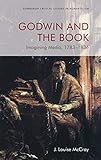Godwin and the Book : Imagining Media, 1783-1836 / J. Louise McCray.
Material type: TextSeries: Edinburgh Critical Studies in Romanticism : ECSRPublisher: Edinburgh : Edinburgh University Press, [2022]Copyright date: ©2021Description: 1 online resource (216 p.)Content type:
TextSeries: Edinburgh Critical Studies in Romanticism : ECSRPublisher: Edinburgh : Edinburgh University Press, [2022]Copyright date: ©2021Description: 1 online resource (216 p.)Content type: - 9781474475761
- 9781474475785
- 823.6 23
- PR4724
- online - DeGruyter
| Item type | Current library | Call number | URL | Status | Notes | Barcode | |
|---|---|---|---|---|---|---|---|
 eBook
eBook
|
Biblioteca "Angelicum" Pont. Univ. S.Tommaso d'Aquino Nuvola online | online - DeGruyter (Browse shelf(Opens below)) | Online access | Not for loan (Accesso limitato) | Accesso per gli utenti autorizzati / Access for authorized users | (dgr)9781474475785 |
Frontmatter -- Contents -- Acknowledgements -- Abbreviations -- Introduction -- 1. The Matter of the Reader: Materialism and Private Judgement -- 2. The Ethics of Novel-Reading: Fiction and Moral Law -- 3. The Discipline of Reading: ‘Enquiry’ and Religious Dissent -- 4. Truth and Social Media: Books and Intellectual Regulation -- 5. Books, Bodies and Monuments: Print and Perfectibility -- Bibliography -- Index
restricted access online access with authorization star
http://purl.org/coar/access_right/c_16ec
Examines the place of media technology in the literary and intellectual history of Romantic-era BritainExplores the literary figuration of media technology and its useOffers a fresh reading of Godwin’s corpus, which involves an unusual claim about its fundamental consistency across time and generic boundariesExamines major controversies of the period, including: the physiology of the mind; the ethics of novel-reading; practical reading advice; the nature of truth; the nature of afterlifeDraws attention to the enormous impact of protestant dissent on the literature and philosophy of the Romantic periodGodwin and the Book explores a network of controversies concerning the relationship of media form to social futurity in Romantic-period Britain through the writing of the notorious philosopher-novelist William Godwin (1756–1836). It offers a fresh reading of Godwin’s fifty-year corpus, using evidence from his fiction, philosophy and essays to argue that, throughout his career, he figured books and reading in particular ways in order to defend a set of inherited beliefs about intellectual perfectibility. In the process, it highlights many wider debates that marked out the culture of this period – including disagreements over the physiology of the mind, the ethics of novel-reading, and the social consequences of death – and considers how these debates were intertwined with the formal development of British prose in the period.
Mode of access: Internet via World Wide Web.
In English.
Description based on online resource; title from PDF title page (publisher's Web site, viewed 25. Jun 2024)


